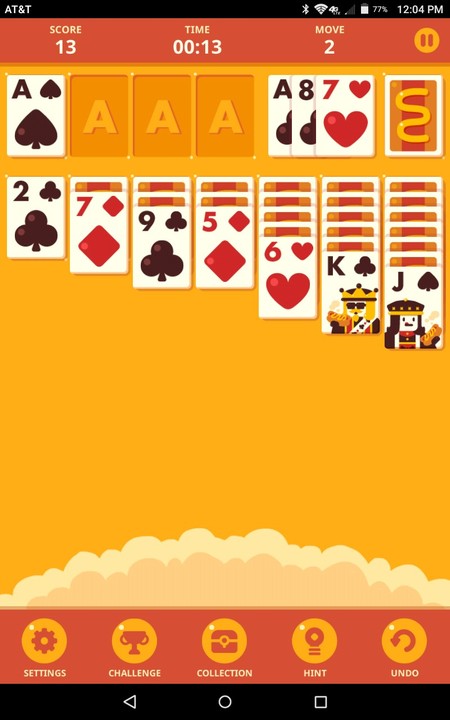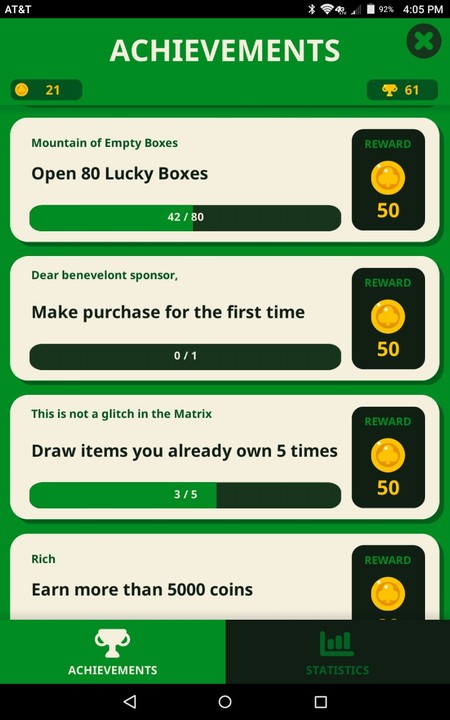
In the wake of those solitaire games with a purpose, the games that have achievements for literally everything and those sorts of games that you pay once for and just own everything in, I'm going to show you a slightly darker side of commercial solitaire. Cute, but sinister. The darkest intentions of capitalism in the 21st century, I'd dare to say.
Solitaire Decked Out was released for mobile platforms in late 2016. Solitaire on mobile devices is already an extraordinarily crowded market, consisting of everything from bit-for-bit recreations of the Microsoft classic (with dubious legality), to gigantic collections containing more games than most people would know about, and some implementations that focus on flashy graphics and in-app purchases everywhere they can be implemented, if not cramming them full of advertisements to squeeze out every last penny of monetization that they can. Considering that online ads are probably the single biggest vector for infection and security breaches (to the point that I am no longer comfortable linking to the citation that originally went here), I am inclined to block the hell out of them at every opportunity I can. Decked Out used to be ad-free at the time this review was written, but is no longer the case, which further inclines me to withdraw most of the good things I originally had to say about it.

Not all of the unlockable decks are aesthetically sound. Windows Hotdog Stand lives on.
Decked Out is a reasonable implementation of Klondike, with options for one-card and three-card deals, and following the less-strict rules that allow partial stacks to be moved, cards to be removed from foundations, and the stock pile to be redealt indefinitely (albeit at the cost of score). The game lacks a standard form of auto-play, but there is a simple auto-move system where cards can be automatically sent to appropriate piles by tapping them (which can be disabled, if you're a purist), and an auto-complete feature that only happens if you answer "yes" when it asks.
Of course with only one game included, Solitaire Decked Out would get awfully monotonous, which is where the Collection comes into play. Whenever you earn enough coins - from random cards or winning games - you spend those coins to open Lucky Boxes, which contain random decks or deck elements. "Deck elements?" See, every deck in Decked Out comes out of the box with the cards themselves (backs and occasionally different face cards) and a color scheme. But each deck also has a number of hidden elements that also unlock, such as animated wallpaper, random events that happen on screen under various conditions, and different win animations (because just flinging the cards everywhere is so 1990, apparently, so why not celebrate with a DJ bear, or a dramatic reenactment of the Hot Dog Wars...?). Buying Lucky Boxes with your coins (or with real money...sigh) gives you these things at random - and it's entirely possible to win an item that you already have.

Oh...oh dear Lord, deliver us...
In addition to things to buy with coins, the game has a number of Achievements that earn you said coins. Sadly, many of these challenges...are not really challenging. Yes, it is absolutely worth the effort to try to win a game in under a minute (hello, auto-move, this is what you were built for!) or over 10 minutes (just leave the thing running, I guess?), to win a lot of games in deal-3 mode...but is it really worth an achievement to have bought more than 80 Lucky Boxes? Or getting more than 5 duplicate items? Or buying anything from the in-game store? These are not achievements. These are guilt trips to the player who doesn't want to pour money into the game.
It is absolutely true that the mobile market is a harsh one. Neither Google Play nor iTunes are especially well regulated, and the world of computerized solitaire is as ubiquitous as it is because people know it well and can be trusted to download whatever appears near the top of the "Top Rated" section if it'll help them kill 30 minutes at the DMV. Games like these strive to make money because the economy of the 21st century dictates that if you can't monetize your hobby, it's not worth pursuing. In the world of Android, even, if a game is open-source, you can count on being totally unable to tell which of 300 different versions of a game is the original one, and which one just added banner ads and a price tag (hello, 2048 and Pixel Dungeon). One does not simply release an Android game for free with no outlet for earnings. It's a thankless thing that few aspire towards. Decked Out is no different, initially marketing itself as "ad-free" before blatantly springing full-screen ads on all of their players only a couple of years later.
I mean, it could be worse...there are almost certainly solitaire games on the Play Store that have energy limits. But Decked Out is not unique among mobile solitaires. By falling in line with the mobile gaming machine, they become even less unique. And every vector towards income that its developers patch in after the fact gives me even less of a reason to ever allow it to be installed on my device. Ever.